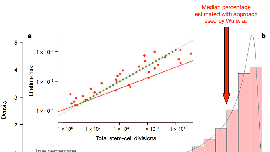
We recently reported a strong correlation between the incidence of cancers and the number of stem-cell divisions in the corresponding normal tissues. We interpreted this correlation to mean that random genomic alterations (termed replicative or intrinsic) arising during DNA replication, as well as mutations that arise owing to environmental (extrinsic) and inherited factors, have important roles in tumorigenesis; however, we did not quantify the contribution of intrinsic versus extrinsic factors to any cancer type1. In their study, Wu et al.4 estimated an upper bound for the contribution of intrinsic factors to many cancer types, concluding that intrinsic factors account for “less than 10–30%” of cancer cases. We believe that several of the assumptions made by these authors led them to underestimate the role of intrinsic factors, and we further show that one of their methods leads to the conclusion that extrinsic factors account for >85% of the risk in situations in which extrinsic factors have no role. There is a Reply to this Comment by Wu, S., Zhu, W. & Hannun, Y. A. Nature 548, 10.1038/nature23303 (2017).



